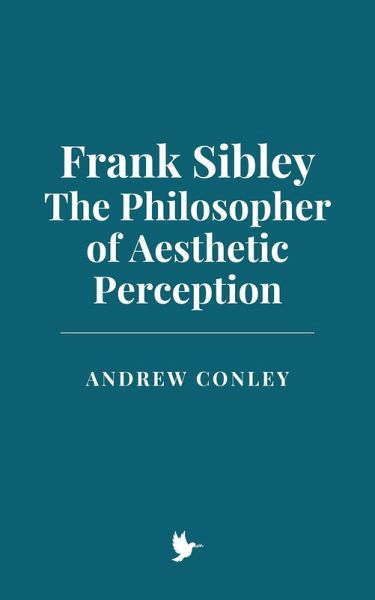
Frank Sibley: The Philosopher of Aesthetic Perception (eBook, ePUB)

PAYBACK Punkte
0 °P sammeln!
Frank Sibley (1923-1996) remains a pivotal figure in the philosophy of aesthetics, renowned for his groundbreaking analyses of aesthetic concepts, properties, and judgment. His work, rooted in the analytic tradition, challenged reductive and universalist approaches to aesthetics by emphasizing the relational, interpretive, and context-sensitive nature of aesthetic experience. Sibley introduced the distinction between aesthetic and non-aesthetic properties, arguing that the former emerge from the relationships among non-aesthetic features but are not reducible to them. This framework underscore...
Frank Sibley (1923-1996) remains a pivotal figure in the philosophy of aesthetics, renowned for his groundbreaking analyses of aesthetic concepts, properties, and judgment. His work, rooted in the analytic tradition, challenged reductive and universalist approaches to aesthetics by emphasizing the relational, interpretive, and context-sensitive nature of aesthetic experience. Sibley introduced the distinction between aesthetic and non-aesthetic properties, arguing that the former emerge from the relationships among non-aesthetic features but are not reducible to them. This framework underscored the importance of perceptual sensitivity-cultivated through experience and education-in recognizing and articulating aesthetic qualities such as elegance, vitality, or grace.
Sibley's work addressed enduring philosophical questions about the objectivity of aesthetic judgment, the role of emotion and meaning in aesthetic experience, and the interplay between perception and interpretation. His ideas have profoundly influenced fields beyond aesthetics, including cognitive science, art criticism, cultural studies, and environmental philosophy. At the same time, his philosophy has been critiqued for its limited engagement with the social, political, and conceptual dimensions of art, as well as for its perceived reliance on Western aesthetic traditions.
This book explores the life, work, and legacy of Frank Sibley, situating his philosophy within its historical and intellectual contexts while engaging with contemporary debates. It examines the breadth and adaptability of his ideas, from their applications in ecological and digital aesthetics to their implications for cross-cultural and interdisciplinary studies. Through deep analysis and commentary, the book highlights Sibley's enduring relevance in addressing the complexities of art, beauty, and taste, offering a comprehensive account of his contributions and their ongoing impact on the philosophy of aesthetics.
Sibley's work addressed enduring philosophical questions about the objectivity of aesthetic judgment, the role of emotion and meaning in aesthetic experience, and the interplay between perception and interpretation. His ideas have profoundly influenced fields beyond aesthetics, including cognitive science, art criticism, cultural studies, and environmental philosophy. At the same time, his philosophy has been critiqued for its limited engagement with the social, political, and conceptual dimensions of art, as well as for its perceived reliance on Western aesthetic traditions.
This book explores the life, work, and legacy of Frank Sibley, situating his philosophy within its historical and intellectual contexts while engaging with contemporary debates. It examines the breadth and adaptability of his ideas, from their applications in ecological and digital aesthetics to their implications for cross-cultural and interdisciplinary studies. Through deep analysis and commentary, the book highlights Sibley's enduring relevance in addressing the complexities of art, beauty, and taste, offering a comprehensive account of his contributions and their ongoing impact on the philosophy of aesthetics.
Dieser Download kann aus rechtlichen Gründen nur mit Rechnungsadresse in A, B, CY, CZ, D, DK, EW, E, FIN, F, GR, H, IRL, I, LT, L, LR, M, NL, PL, P, R, S, SLO, SK ausgeliefert werden.













